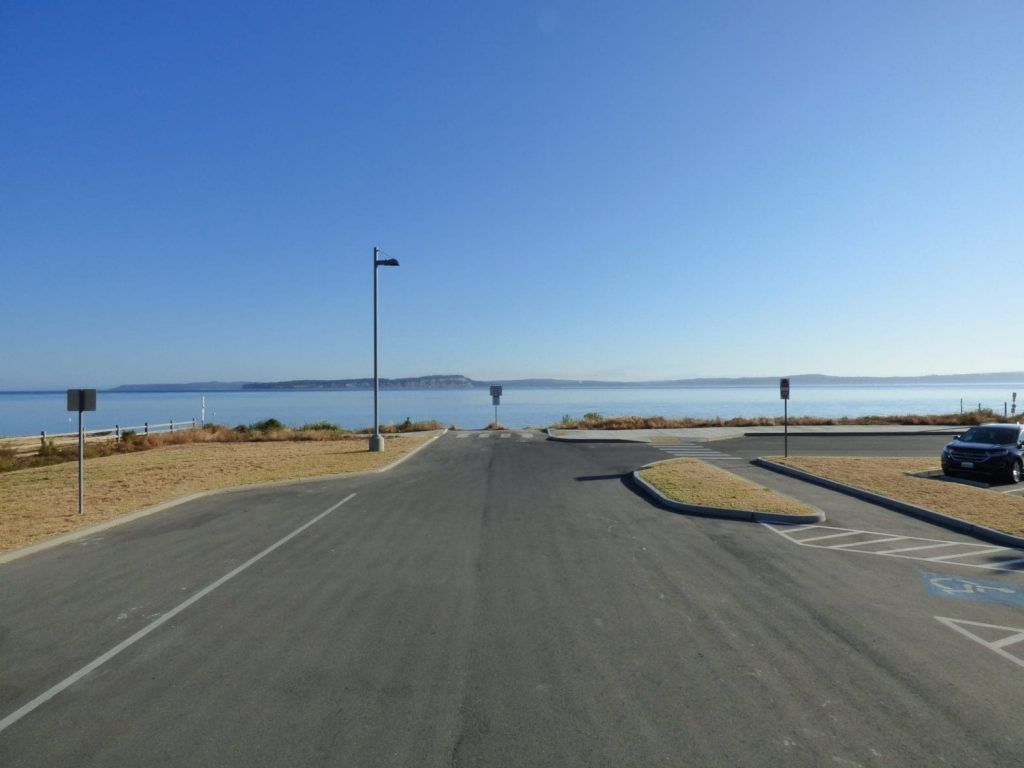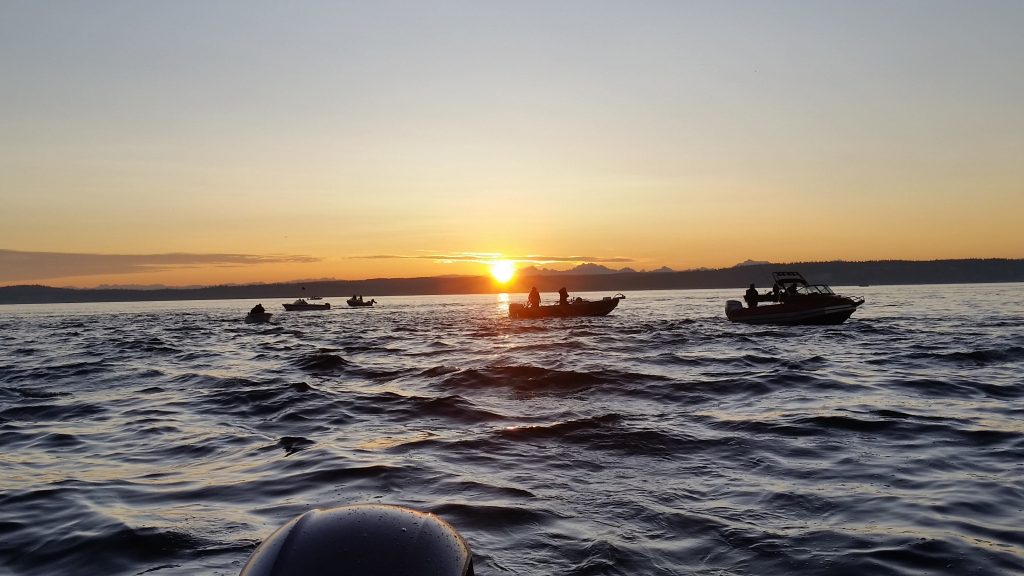
WDFW, Angler Advocate, Tribe React To Corps’ PNP Boat Ramp Denial
WDFW and a sportfishing advocate are reacting with disappointment to this week’s news that the local head of the Army Corps of Engineers has denied their bid to build a new boat launch at Point No Point, while the leader of the tribe that staunchly opposed its construction says the feds have done their job.
The disagreement over permitting a one-lane concrete ramp at the site of an old resort on the northern Kitsap Peninsula has been going on for years as WDFW has sunk millions into sprucing up the site and planning.
“We’re deeply disappointed with the US Army Corps of Engineers decision to deny the permit to construct a small boat launch at Point No Point,” said agency Director Kelly Susewind in a statement Friday morning.

He said that the ramp there “would have improved boating access for everyone” and WDFW’s plans to build it had undergone “extensive outreach with the Corps, the tribes, the county, and the public.”
The site was acquired by WDFW in 1996 and Susewind said the agency removed the resort’s old rail launch system and just under 100 creosote pilings from Puget Sound.
In 2013, WDFW applied to the Corps for the permit to build in the water and per a Kitsap Sun article, as of 2019 had spent $2.9 million on cleanup, paving and preparatory work for the ramp, among other costs.
But years of back-and-forth with the Suquamish Tribe and the Corps, correspondence detailed on a timeline from ramp advocates, slowed installation of the new launch.
And now it’s effectively come to a stop with the July 28 letter from the Corps’ Seattle District engineer Col. Alexander “Xander” Bullock.
Bullock told Susewind he denied the permit because it “would result in an impermissible abrogation of the Suquamish Tribe’s reserved treaty rights because of the extent it would impair or obstruct the Tribe’s access to its usual and accustomed fishing areas.”
That drew pushback this morning from Nello Picinich of Coastal Conservation Association of Washington.
“It is hard to imagine how an underwater concrete ramp, designed for public usage, could pose an eminent threat to skilled boaters, crabbers and fishers. There is nothing unique about this ramp that makes it significantly different than most other concrete boat ramps in Puget Sound,” he said.
Picinich’s CCA is among six fishing and boating organizations that have backed the new ramp. Others include Puget Sound Anglers, Bremerton Sportsmen’s Club, Kitsap Parks Advocates, Kitsap Poggie Club and Northwest Marine Trade Association. His comments came in a statement headlined “Honoring treaty obligations while promoting rights for the public to access Puget Sound waters.”
“Everything except the concrete boat ramp has been completed,” noted Picinich, who feels the Corps’ denial also “sets a dangerous precedent and jeopardizes the future viability of both publicly and privately owned boat launches.”
WDFW has argued that there was no solid evidence that the new ramp would have more than a de minimis, or trivial, impact on treaty harvest rights and that claims of interference implied the tribe had “exclusive rights to the surface waters in their (usual and accustomed fishing area)” rather than shared access to the state’s navigable waters.
“WDFW has a responsibility to provide recreational and commercial opportunities for the state’s citizens, but in this case, some of that opportunity is being taken away,” Picinich lamented.

Bullock’s decision was presaged by a 46-page “Memorandum For Record” issued by the Corps this April.
It details the “three essential questions” he would analyze to determine whether the Suquamish Tribe had proven their claims the ramp would “physically block access” to their U&A.
“First, is the project within the tribe’s usual and accustomed fishing grounds and stations?” the memo asks. “Second, would the proposed project have an effect on the tribe’s access to those fishing places as reflected in documented evidence of past, present, or future fishing activity at that location? Third, based on these particular facts as presented and substantiated to the Corps in regards to this particular DA-regulated activity, and given the existing case-law, would the authorization of this DA-regulated activity result in an impermissible abrogation of the treaty right because of the extent it impairs or obstructs the tribe’s access to U&A places? Each of these issues has been thoroughly evaluated and considered by the Corps based on the particular facts regarding the nature of the effects of this project proposal on tribal activities in the administrative record, as provided by the Tribe and the Applicant.”
In 2020 letters to the Corps, the Suquamish maintained that the ramp would be “an obstacle that our fishermen will be forced to maneuver around and avoid thus excluding the Tribe from engaging in treaty-reserved fishing and harvesting activities” and said it would concentrate boat traffic in a “treaty reserved fishing ground and station,” interfering with tribal fishermen and damage their gear.
According to the Suquamish Tribe, Bullock looked at their traditional harvest methods as well as “ceremonial and cultural” aspects of treaty fishing rights in concluding the ramp would impair access.
“The Army Corps decision denying WDFW’s boat ramp protects not only the Suquamish Tribe’s treaty rights but also the other tribes with fishing rights in the area,” said Suquamish Tribe Chair Leonard Forsman in a press release this morning.
Four other North Sound and east Straits tribes had issued objections to the ramp.
Forsman said that Point No Point was also a Suquamish tribal village site through the 1800s and home to a former chief, Challicum.
He said the tribe tried to work with WDFW on ways to limit the impact of the ramp, including keeping it to only watercraft that could be carried down to the shore and launched, as well as pushing funding instead to upgrading the Salisbury Point County Park launch on the Hood Canal side of the Kitsap Peninsula, which would benefit sport and tribal fishermen.
“The impacts from the proposed boat ramp to the Tribe’s treaty-reserved right to access our fishing grounds were never addressed, so we remained in opposition to the project,” Forsman said.
He said tribal leaders have a “responsibility” to protect their people’s treaty rights and cultural practices and that the Corps had “upheld its trust obligation and legal obligation to the Suquamish Tribe and other similarly situated tribes when it denied this permit application.”
It all leaves future development of the site at something of a loggerhead.
“For WDFW to fulfill its self-stated directive of providing opportunity, the public is depending on them to pursue reversal of the Corps decision, as it has profound ramifications for nearly all public and private boat ramps in Puget Sound,” said CCA’s Picinich.
“We need to assess our options on how best to proceed and we will continue to work with partners to ensure there is sufficient boating access to this area,” said Susewind.
Bullock’s decision apparently can’t be appealed, but his letter states that Susewind can “reinstate processing of the Department of the Army permit application should you conclude an arrangement by which tribal objections are resolved and withdrawn.”
While anglers and others will still be able to carry kayaks and other small craft down to the beach to mooch and troll fishy Point No Point, Kitsap Peninsula anglers and crabbers with larger boats will continue to need to run the 7 to 10 miles up from Kingston or around Foulweather Bluff from Salisbury Point.


